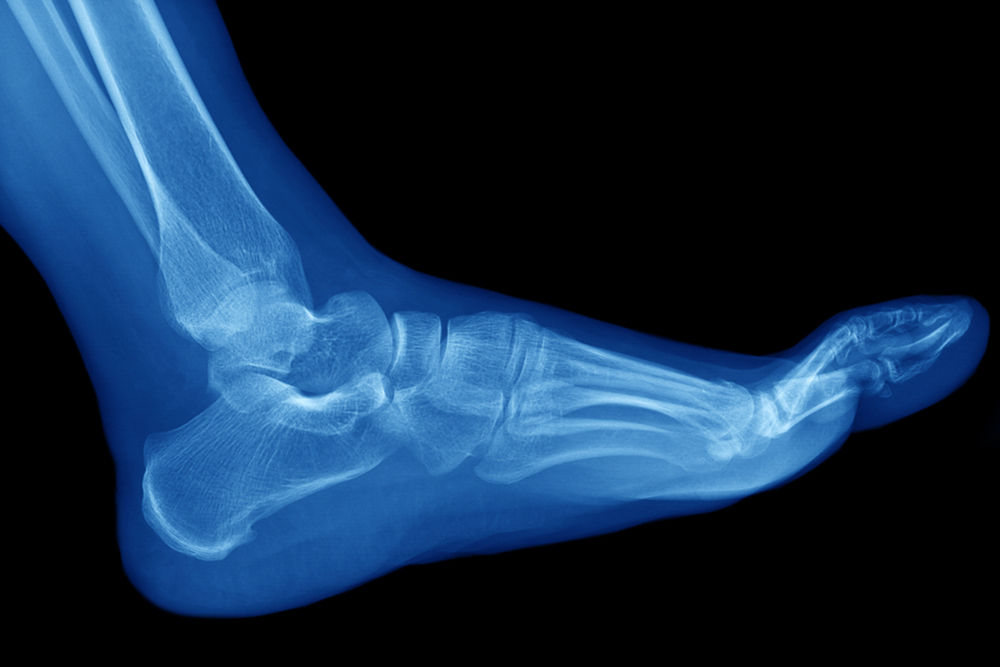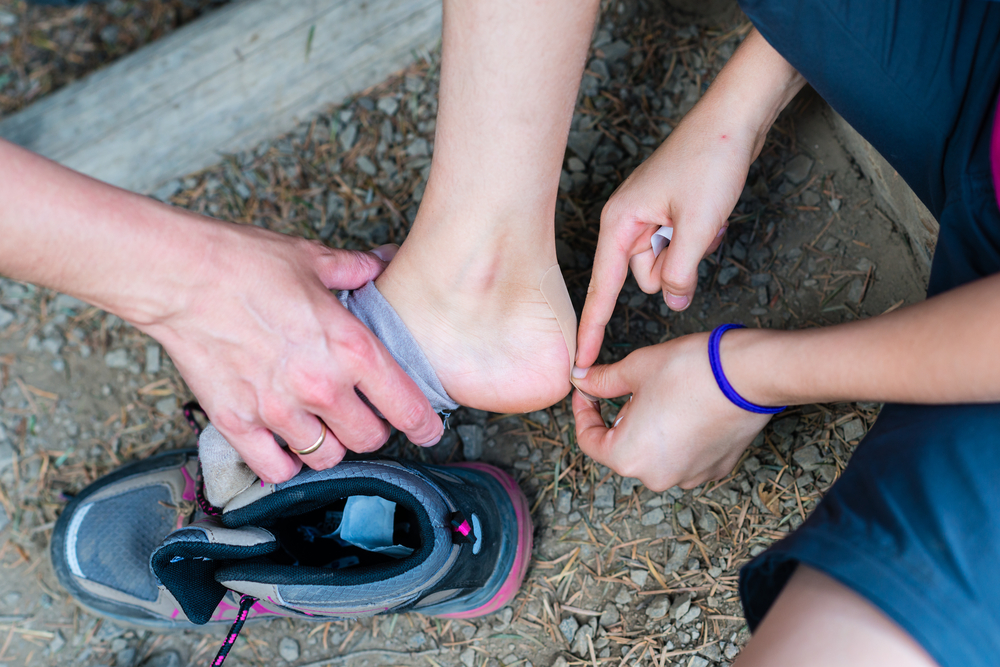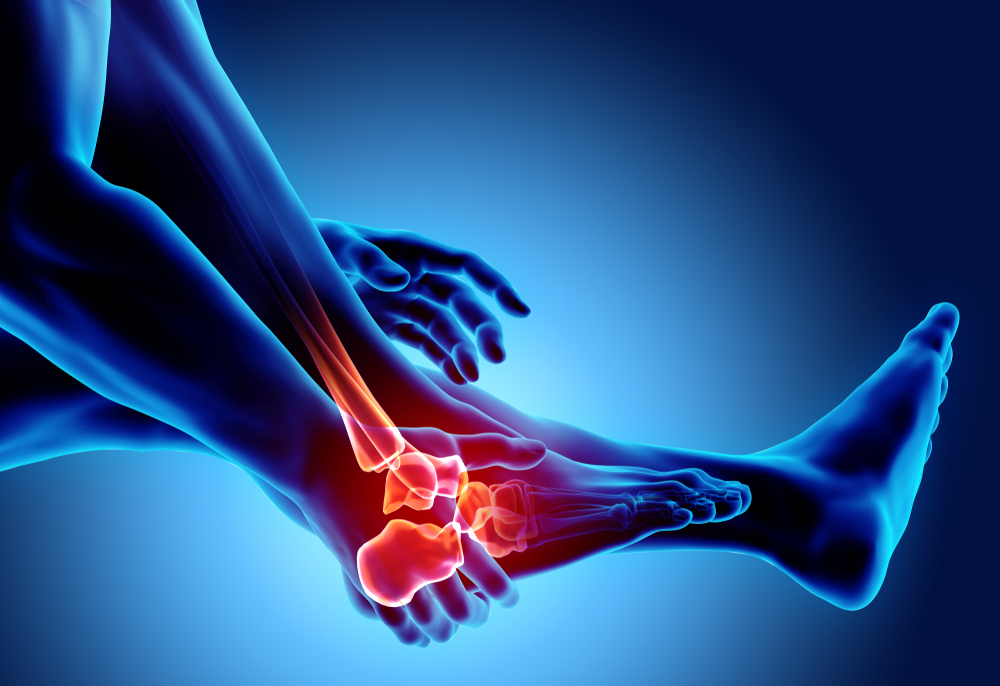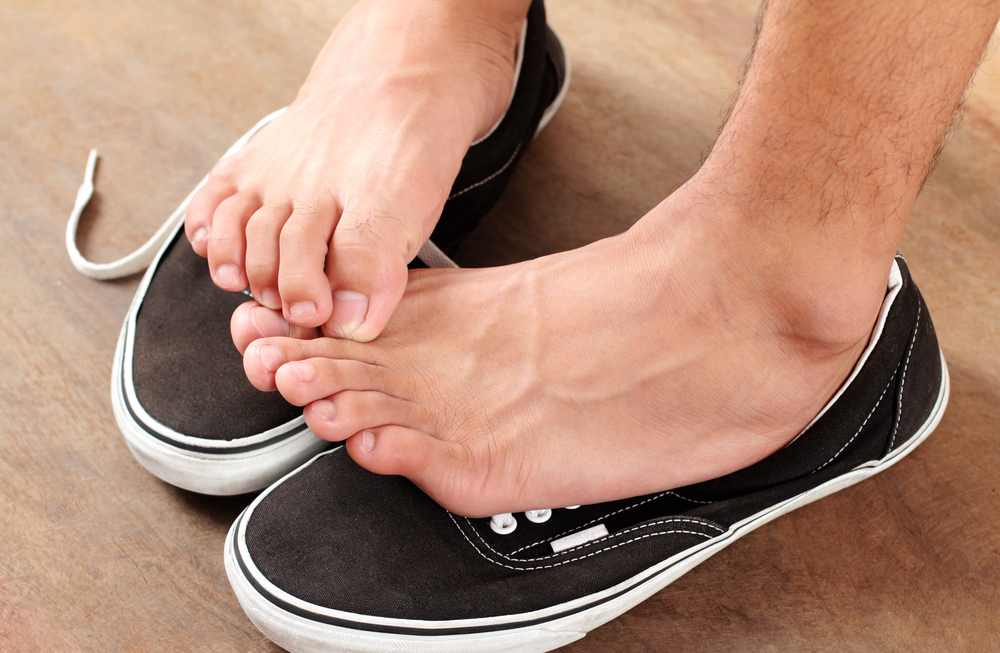 Fatigue fractures, which are known as stress fractures, occur when there is stress that is exerted on the bone. The foot is a common place for this to happen, and it can occur from increasing mileage and speed too quickly while running. The area may be tender to touch, and there can be severe pain and discomfort. A stress fracture can be confirmed when a proper diagnosis is performed. This can include having an X-ray or MRI taken, and then proper treatment can begin. It is beneficial to temporarily stop practicing the activity that led to the stress fracture. Patients have found mild relief when the affected foot is elevated. Many patients can perform non-impact exercises that can include swimming and cycling. This can help to maintain exercise goals while the injured foot is healing. Gradually, the normal routine of exercise and activities can be resumed, when the stress fracture has healed. If you feel you may have endured a stress fracture in your foot, it is strongly advised that you consult a podiatrist who can properly treat this condition.
Fatigue fractures, which are known as stress fractures, occur when there is stress that is exerted on the bone. The foot is a common place for this to happen, and it can occur from increasing mileage and speed too quickly while running. The area may be tender to touch, and there can be severe pain and discomfort. A stress fracture can be confirmed when a proper diagnosis is performed. This can include having an X-ray or MRI taken, and then proper treatment can begin. It is beneficial to temporarily stop practicing the activity that led to the stress fracture. Patients have found mild relief when the affected foot is elevated. Many patients can perform non-impact exercises that can include swimming and cycling. This can help to maintain exercise goals while the injured foot is healing. Gradually, the normal routine of exercise and activities can be resumed, when the stress fracture has healed. If you feel you may have endured a stress fracture in your foot, it is strongly advised that you consult a podiatrist who can properly treat this condition.
Activities where too much pressure is put on the feet can cause stress fractures. To learn more, contact Brent Harwood, DPM from Southeast Podiatry. Our doctor can provide the care you need to keep your pain free and on your feet.
Dealing with Stress Fractures of the Foot and Ankle
Stress fractures occur in the foot and ankle when muscles in these areas weaken from too much or too little use. The feet and ankles then lose support when walking or running from the impact of the ground. Since there is no protection, the bones receive the full impact of each step. Stress on the feet can cause cracks to form in the bones, thus creating stress fractures.
What Are Stress Fractures?
Stress fractures occur frequently in individuals whose daily activities cause great impact on the feet and ankles. Stress factors are most common among:
Symptoms
Pain from the fractures occur in the area of the fractures and can be constant or intermittent. It will often cause sharp or dull pain with swelling and tenderness. Engaging in any kind of activity which involves high impact will aggravate pain.
If you have any questions, please feel free to contact one of our offices located in Fairhope, Brewton, and Atmore, AL. We offer the newest diagnostic and treatment technologies for all your foot care needs.
 As women gain weight during pregnancy, it is common for their legs and feet to begin swelling and aching. This is mainly a side-effect of the normal buildup of fluids in the body as the baby grows. Further, the center of gravity changes as the months go by, affecting the legs and feet and the way she walks and stands. Proper footwear is essential to help reduce discomfort or the chance of accidents or serious illness. Suggestions for changes in footwear during pregnancy include buying shoes at least a half size larger than normal, choosing shoes with high arch and ankle support, and wearing slip-ons rather than shoes that tie. Further, high heels should be avoided as much as possible, to reduce the chance of falling or twisting an ankle. Low and wider heels help distribute body weight better, and shoes with a wider toe box are a good idea for improved stability and comfort. If you have questions about foot health during pregnancy, it is wise to consult a podiatrist who can guide you in making the proper footwear decisions.
As women gain weight during pregnancy, it is common for their legs and feet to begin swelling and aching. This is mainly a side-effect of the normal buildup of fluids in the body as the baby grows. Further, the center of gravity changes as the months go by, affecting the legs and feet and the way she walks and stands. Proper footwear is essential to help reduce discomfort or the chance of accidents or serious illness. Suggestions for changes in footwear during pregnancy include buying shoes at least a half size larger than normal, choosing shoes with high arch and ankle support, and wearing slip-ons rather than shoes that tie. Further, high heels should be avoided as much as possible, to reduce the chance of falling or twisting an ankle. Low and wider heels help distribute body weight better, and shoes with a wider toe box are a good idea for improved stability and comfort. If you have questions about foot health during pregnancy, it is wise to consult a podiatrist who can guide you in making the proper footwear decisions.
Pregnant women with swollen feet can be treated with a variety of different methods that are readily available. For more information about other cures for swollen feet during pregnancy, consult with Brent Harwood, DPM from Southeast Podiatry. Our doctor will attend to all of your foot and ankle needs.
What Foot Problems Can Arise During Pregnancy?
One problem that can occur is overpronation, which occurs when the arch of the foot flattens and tends to roll inward. This can cause pain and discomfort in your heels while you’re walking or even just standing up, trying to support your baby.
Another problem is edema, or swelling in the extremities. This often affects the feet during pregnancy but tends to occur in the later stages.
How Can I Keep My Feet Healthy During Pregnancy?
If you have any questions, please feel free to contact one of our offices located in Fairhope, Brewton, and Atmore, AL. We offer the newest diagnostic and treatment technologies for all your foot care needs.
 Blisters on the feet can be uncomfortable, painful, and if infected, can become a serious health issue. Blisters are a small pocket of fluid that develops over a damaged portion of skin. This is the body’s natural defense in protecting the area as new skin forms. Blisters can develop from wearing shoes that do not fit correctly, and this can cause the foot to rub against the shoe. Many patients find it helpful to keep their feet as dry as possible, and this can aid in preventing blisters. Additionally, blisters can develop from a severe sun or chemical burn, frostbite, or possibly from an allergic reaction. If you have developed blisters on your feet, it is suggested that you speak to a podiatrist who can guide you toward proper treatment and healing techniques.
Blisters on the feet can be uncomfortable, painful, and if infected, can become a serious health issue. Blisters are a small pocket of fluid that develops over a damaged portion of skin. This is the body’s natural defense in protecting the area as new skin forms. Blisters can develop from wearing shoes that do not fit correctly, and this can cause the foot to rub against the shoe. Many patients find it helpful to keep their feet as dry as possible, and this can aid in preventing blisters. Additionally, blisters can develop from a severe sun or chemical burn, frostbite, or possibly from an allergic reaction. If you have developed blisters on your feet, it is suggested that you speak to a podiatrist who can guide you toward proper treatment and healing techniques.
Blisters are prone to making everyday activities extremely uncomfortable. If your feet are hurting, contact Brent Harwood, DPM from Southeast Podiatry. Our doctor can provide the care you need to keep you pain-free and on your feet.
Foot Blisters
Foot blisters develop as a result of constantly wearing tight or ill-fitting footwear. This happens due to the constant rubbing from the shoe, which can often lead to pain.
What Are Foot Blisters?
A foot blister is a small fluid-filled pocket that forms on the upper-most layer of the skin. Blisters are filled with clear fluid and can lead to blood drainage or pus if the area becomes infected.
How Do Blisters Form?
Blisters on the feet are often the result of constant friction of skin and material, usually by shoe rubbing. Walking in sandals, boots, or shoes that don’t fit properly for long periods of time can result in a blister. Having consistent foot moisture and humidity can easily lead to blister formation.
Prevention & Treatment
It is important to properly care for the affected area in order to prevent infection and ease the pain. Do not lance the blister and use a Band-Aid to provide pain relief. Also, be sure to keep your feet dry and wear proper fitting shoes. If you see blood or pus in a blister, seek assistance from a podiatrist.
If you have any questions, please feel free to contact one of our offices located in Fairhope, Brewton, and Atmore, AL. We offer the newest diagnostic and treatment technologies for all your foot care needs.
 An effective stretch that benefits the bottom of the foot is known as a toe squat. It is known to strengthen the plantar fascia, which is the portion of tissue that is found on the sole of the foot. It connects the heel to the toes and is instrumental in performing daily activities that include walking and running. This stretch is performed by keeping your feet together as you are sitting on your heels. As the toes are tucked under, it is important to remain on the balls of the feet and avoid the tips of the toes. Breathing with the posture may intensify the stretch, as it is being held for two to three minutes. People who practice this stretch find it is beneficial to slowly release the position, and this can help to protect the bottom of the foot. If you would like to learn more about how to practice effective foot stretches, please speak with a podiatrist.
An effective stretch that benefits the bottom of the foot is known as a toe squat. It is known to strengthen the plantar fascia, which is the portion of tissue that is found on the sole of the foot. It connects the heel to the toes and is instrumental in performing daily activities that include walking and running. This stretch is performed by keeping your feet together as you are sitting on your heels. As the toes are tucked under, it is important to remain on the balls of the feet and avoid the tips of the toes. Breathing with the posture may intensify the stretch, as it is being held for two to three minutes. People who practice this stretch find it is beneficial to slowly release the position, and this can help to protect the bottom of the foot. If you would like to learn more about how to practice effective foot stretches, please speak with a podiatrist.
Stretching the feet is a great way to prevent injuries. If you have any concerns with your feet consult with Brent Harwood, DPM from Southeast Podiatry. Our doctor will assess your condition and provide you with quality podiatric treatment.
Stretching the Feet
Being the backbone of the body, the feet carry your entire weight and can easily become overexerted, causing cramps and pain. As with any body part, stretching your feet can serve many benefits. From increasing flexibility to even providing some pain relief, be sure to give your feet a stretch from time to time. This is especially important for athletes or anyone performing aerobic exercises, but anyone experiencing foot pain or is on their feet constantly should also engage in this practice.
Great ways to stretch your feet:
Individuals who tend to their feet by regular stretching every day should be able to minimize foot pain and prevent new problems from arising.
If you have any questions, please feel free to contact one of our offices located in Fairhope, Brewton, and Atmore, AL. We offer the newest diagnostic and treatment technologies for all your foot care needs.
 Rheumatoid arthritis (RA) is an autoimmune disease in which the body’s immune system attacks the otherwise healthy cells that make up the linings of joints. Because each foot contains 33 joints, the feet, as well as the ankles, are often affected. RA can make other foot and ankle conditions more likely to occur. One such condition is tarsal tunnel syndrome, in which the posterior tibial nerve is compressed or damaged, causing burning pain, numbness, and tingling in the affected foot. Tarsal tunnel syndrome is frequently seen in people with RA. If you have RA, it is suggested that you be under the care of a podiatrist who can monitor the health of your feet and treat any problems as they arise.
Rheumatoid arthritis (RA) is an autoimmune disease in which the body’s immune system attacks the otherwise healthy cells that make up the linings of joints. Because each foot contains 33 joints, the feet, as well as the ankles, are often affected. RA can make other foot and ankle conditions more likely to occur. One such condition is tarsal tunnel syndrome, in which the posterior tibial nerve is compressed or damaged, causing burning pain, numbness, and tingling in the affected foot. Tarsal tunnel syndrome is frequently seen in people with RA. If you have RA, it is suggested that you be under the care of a podiatrist who can monitor the health of your feet and treat any problems as they arise.
Tarsal tunnel syndrome can be very uncomfortable to live with. If you are experiencing tarsal tunnel syndrome, contact Brent Harwood, DPM from Southeast Podiatry. Our doctor can provide the care you need to keep you pain-free and on your feet.
Tarsal Tunnel Syndrome
Tarsal tunnel syndrome, which can also be called tibial nerve dysfunction, is an uncommon condition of misfiring peripheral nerves in the foot. The tibial nerve is the peripheral nerve in the leg responsible for sensation and movement of the foot and calf muscles. In tarsal tunnel syndrome, the tibial nerve is damaged, causing problems with movement and feeling in the foot of the affected leg.
Common Cause of Tarsal Tunnel Syndrome
The Effects of Tarsal Tunnel Syndrome
A physical exam of the leg can help identify the presence of tarsal tunnel syndrome. Medical tests, such as a nerve biopsy, are also used to diagnose the condition. Patients may receive physical therapy and prescriptive medication. In extreme cases, some may require surgery.
If you have any questions, please feel free to contact one of our offices located in Fairhope, Brewton, and Atmore, AL. We offer the newest diagnostic and treatment technologies for all your foot care needs.
 Tinea Pedis, more commonly known as athlete’s foot, is a fungal infection that affects the feet and toes. The fungi that cause athlete’s foot thrive in warm and moist environments. The condition is very contagious and often spreads in areas such as communal locker rooms, pools, showers, and even sweaty footwear. Common signs of athlete’s foot include scaling, redness, itchiness, and in severe cases, fissuring (or deep cracking) of the skin. Since athlete’s foot can spread easily, patients who believe they have this condition would be wise to consult with a podiatrist for a proper diagnosis and treatment plan. The infection will likely need to be treated with antifungal medications, and measures may need to be implemented to keep the feet clean and dry.
Tinea Pedis, more commonly known as athlete’s foot, is a fungal infection that affects the feet and toes. The fungi that cause athlete’s foot thrive in warm and moist environments. The condition is very contagious and often spreads in areas such as communal locker rooms, pools, showers, and even sweaty footwear. Common signs of athlete’s foot include scaling, redness, itchiness, and in severe cases, fissuring (or deep cracking) of the skin. Since athlete’s foot can spread easily, patients who believe they have this condition would be wise to consult with a podiatrist for a proper diagnosis and treatment plan. The infection will likely need to be treated with antifungal medications, and measures may need to be implemented to keep the feet clean and dry.
Athlete’s Foot
Athlete’s foot is often an uncomfortable condition to experience. Thankfully, podiatrists specialize in treating athlete’s foot and offer the best treatment options. If you have any questions about athlete’s foot, consult with Brent Harwood, DPM from Southeast Podiatry. Our doctor will assess your condition and provide you with quality treatment.
What Is Athlete’s Foot?
Tinea pedis, more commonly known as athlete’s foot, is a non-serious and common fungal infection of the foot. Athlete’s foot is contagious and can be contracted by touching someone who has it or infected surfaces. The most common places contaminated by it are public showers, locker rooms, and swimming pools. Once contracted, it grows on feet that are left inside moist, dark, and warm shoes and socks.
Prevention
The most effective ways to prevent athlete’s foot include:
Symptoms
Athlete’s foot initially occurs as a rash between the toes. However, if left undiagnosed, it can spread to the sides and bottom of the feet, toenails, and if touched by hand, the hands themselves. Symptoms include:
Diagnosis and Treatment
Diagnosis is quick and easy. Skin samples will be taken and either viewed under a microscope or sent to a lab for testing. Sometimes, a podiatrist can diagnose it based on simply looking at it. Once confirmed, treatment options include oral and topical antifungal medications.
If you have any questions, please feel free to contact one of our offices located in Fairhope, Brewton, and Atmore, AL. We offer the newest diagnostic and treatment technologies for all your foot care needs.